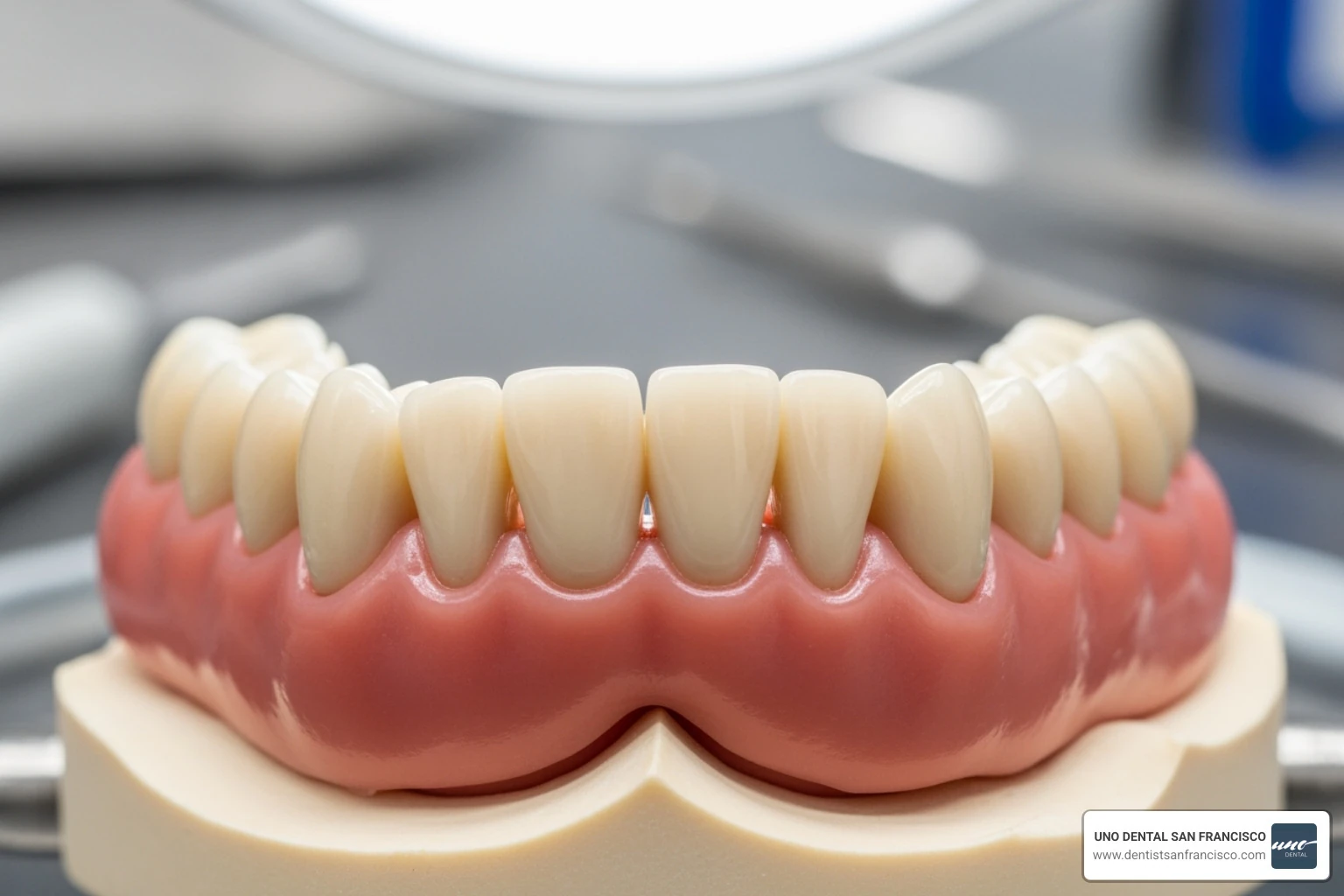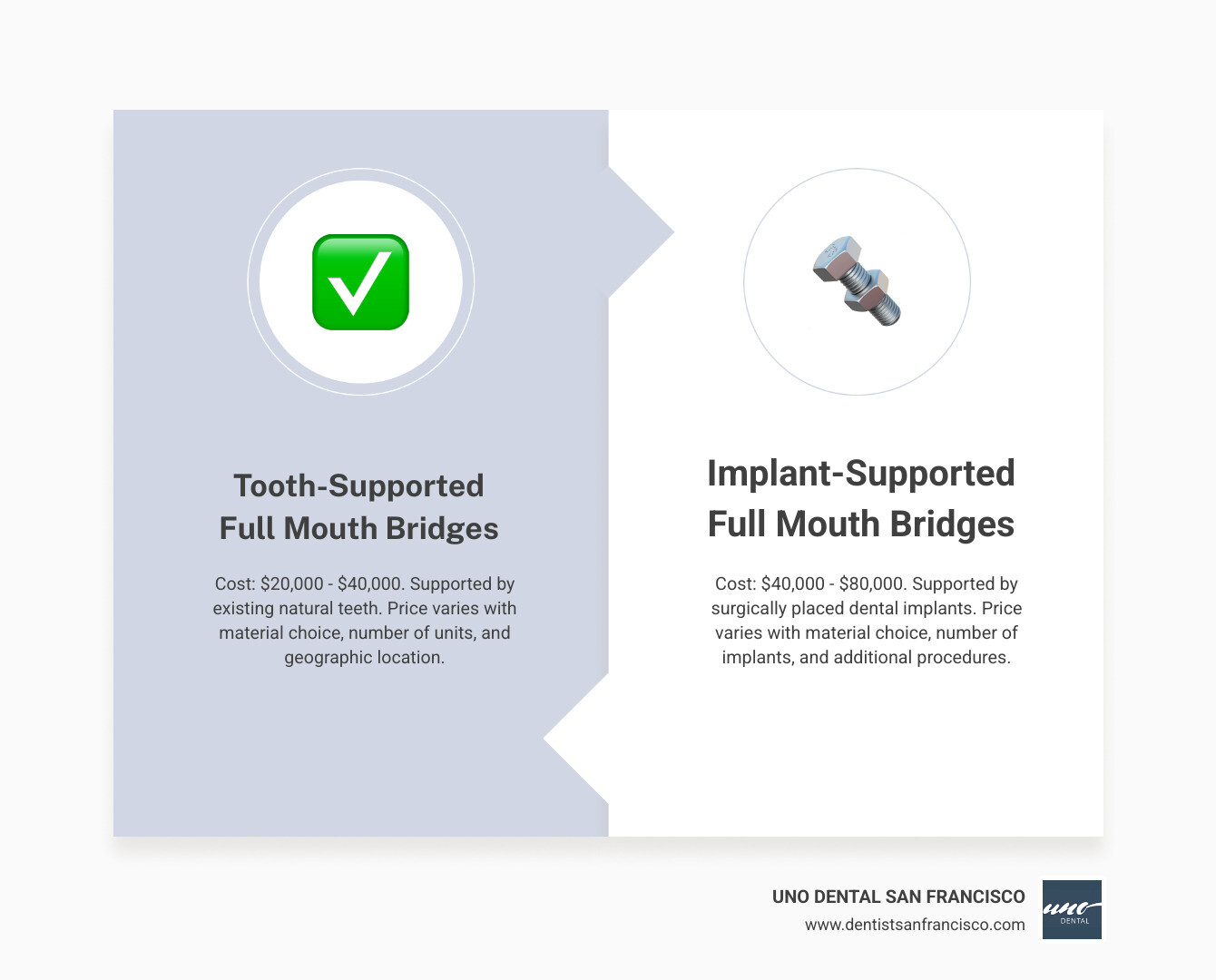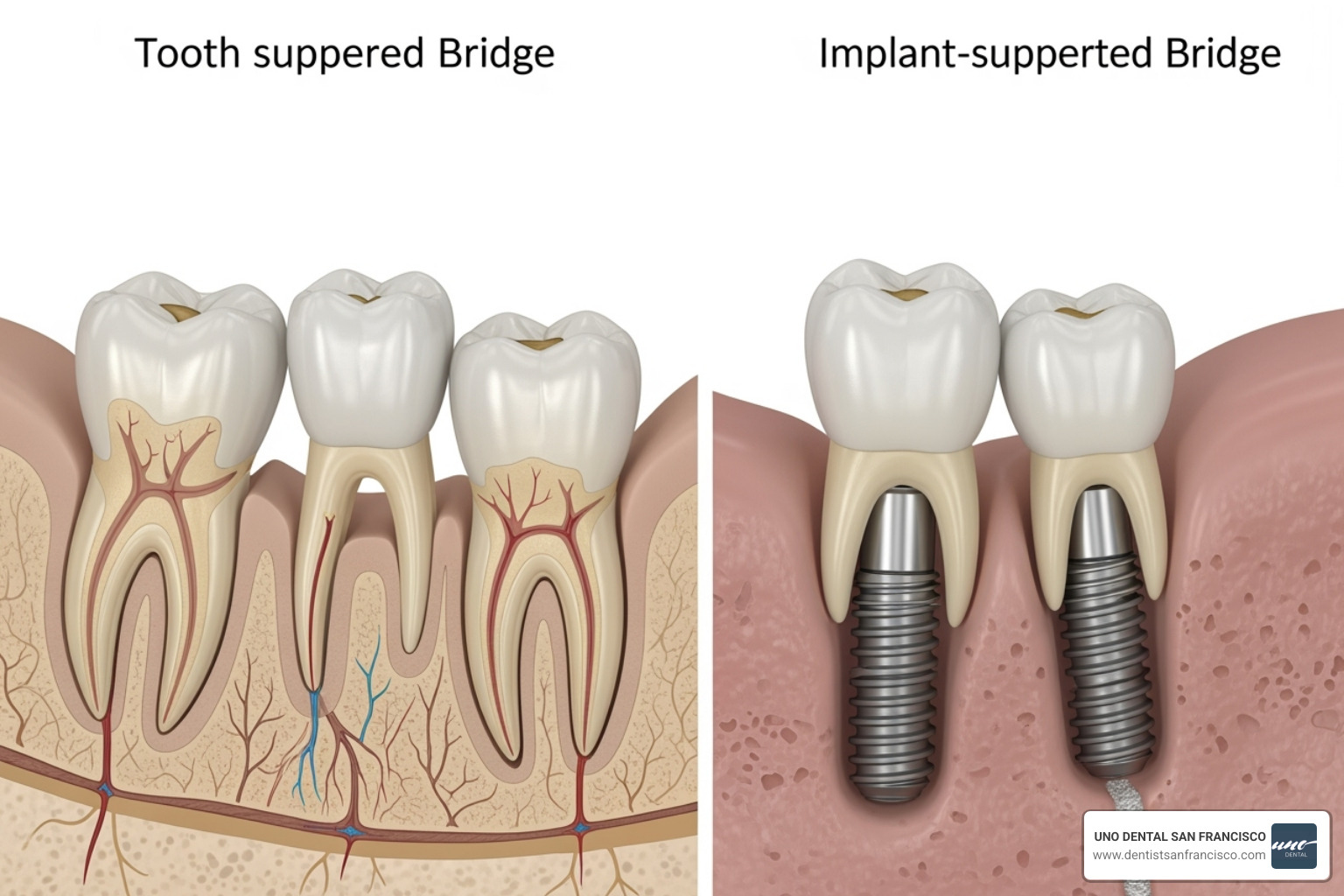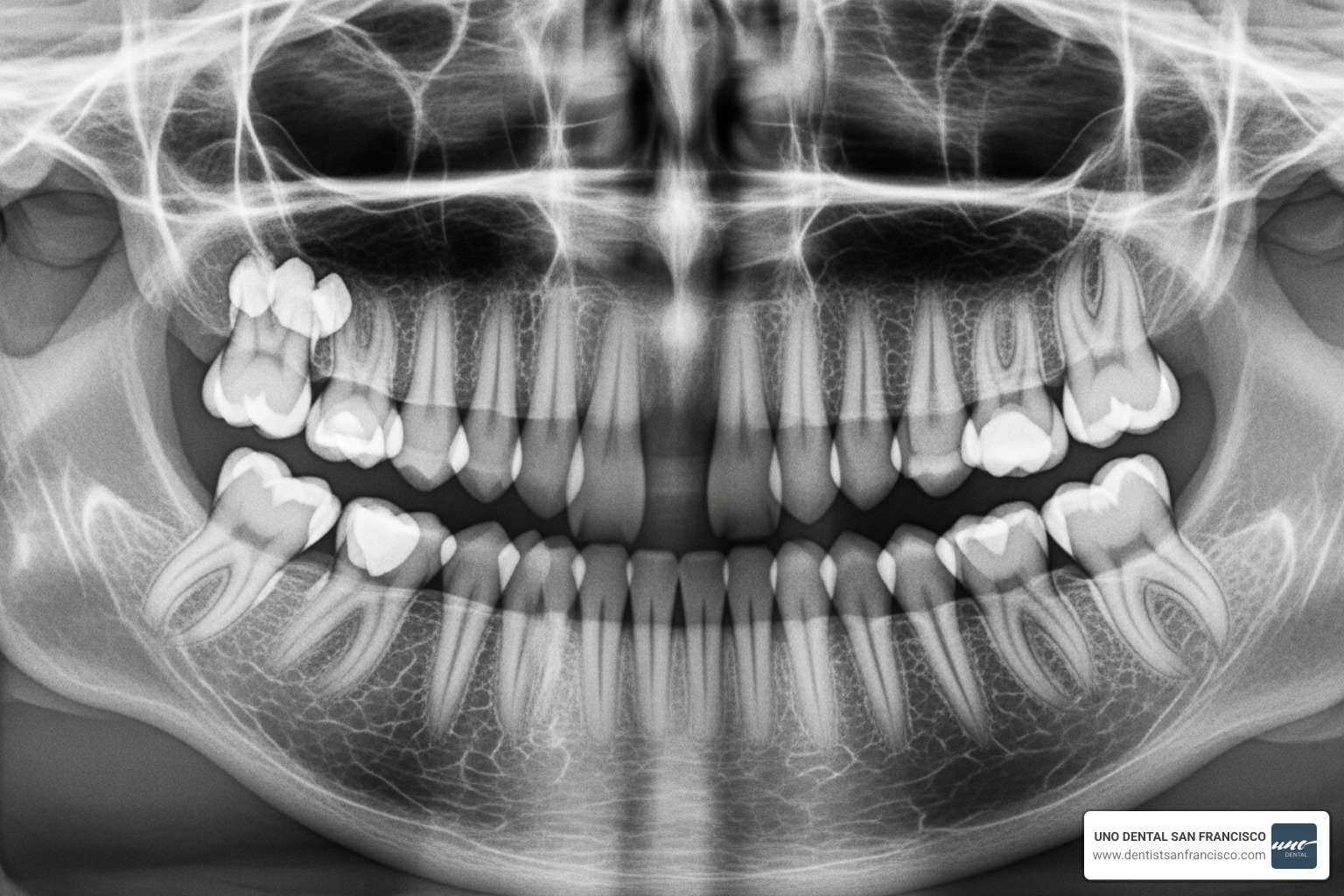
Understanding Full Mouth Bridge Costs: What You Need to Know
Full mouth bridge cost can range from $20,000 to $80,000 depending on several key factors. This significant investment in your oral health varies based on the type of bridge system, materials chosen, and your specific dental needs.
Quick Cost Breakdown:
- Tooth-supported full mouth bridges: $20,000 - $40,000
- Implant-supported full mouth bridges: $40,000 - $80,000
- Per bridge unit: $2,000 - $15,000
- Additional procedures: $500 - $5,000 per treatment
The wide price range reflects the complexity of full mouth restoration. Unlike single tooth bridges that typically cost $2,000 to $5,000, full mouth bridges require multiple connected units to restore an entire arch or both upper and lower teeth.
Several factors drive these costs higher than traditional bridges. Material choice significantly impacts pricing - premium zirconia costs more than porcelain-fused-to-metal options. Geographic location also matters, with San Francisco dental fees typically running higher than national averages.
Most dental insurance plans cover 50% of major restorative work like bridges, but annual maximums of $1,500-$2,000 mean you'll pay most costs out-of-pocket. Many patients use financing options or payment plans to manage the investment.
At UNO DENTAL, our team, including specialists like Dr. Mohammad Aghiad Kandar DDS, brings over 15 years of experience to complex restorative cases. We have helped hundreds of patients understand full mouth bridge cost factors and develop personalized treatment plans that fit their budget and oral health goals. Our expertise in prosthodontics and a patient-focused approach ensures you receive comprehensive care custom to your specific needs.
Simple guide to Full mouth bridge cost:
Understanding What a Full Mouth Bridge Entails
Think of a full mouth bridge as the difference between fixing a single broken window versus renovating an entire floor of your home. While a regular bridge replaces just one to three missing teeth, a full mouth restoration tackles an entire upper arch, lower arch, or both jaws completely.
This comprehensive solution falls under fixed prosthodontics - essentially permanent dental work that stays put 24/7. Unlike removable dentures that you take out at night, these bridges become a permanent part of your smile.
The magic happens through something called abutment teeth and pontics. The abutments act like pillars supporting a real bridge, while pontics are the artificial teeth that fill the gaps. When you need full mouth reconstruction, we're talking about multiple connected units working together to restore your entire bite.
Tooth-supported bridges work when you still have healthy natural teeth to anchor the restoration. We prepare these existing teeth to receive crowns, which then support the artificial teeth between them. It's like using strong fence posts to hold up sections of fencing - your natural teeth become the posts.
But what happens when most of your natural teeth are gone or too weak to support a full restoration? That's where implant-supported bridges shine. Instead of relying on your existing teeth, we place dental implants directly into your jawbone. These titanium posts fuse with your bone and create incredibly strong anchors for your new teeth.
The choice between these two approaches significantly affects your full mouth bridge cost. Implant-supported options require surgical placement and more complex procedures, but they often provide superior long-term stability and bone preservation.
Whether we're restoring your smile with tooth-supported or implant-supported bridges, the goal remains the same - giving you back the confidence to eat, speak, and smile without worry. For a deeper dive into all your restoration options, check out our Full Mouth Reconstruction Complete Guide.
Key Factors That Determine the Full Mouth Bridge Cost
When you're considering a full mouth bridge, understanding what drives the cost helps you make informed decisions about your investment. The full mouth bridge cost isn't a one-size-fits-all number - it's influenced by several important factors that directly relate to your unique dental situation and treatment goals.
Think of it like renovating your entire home versus just updating a single room. A full mouth restoration requires careful planning, premium materials, and often additional preparatory work to ensure everything functions beautifully for years to come. Our comprehensive Restorative Dentistry Complete Guide can help you understand the full scope of what's involved.
Bridge Type and Number of Units
The type of bridge system you choose makes the biggest difference in your overall investment. Implant-supported bridges typically cost more upfront than tooth-supported bridges, but there's good reason for this difference.
Tooth-supported bridges rely on your existing natural teeth as anchors, which works well when you have healthy teeth strategically positioned throughout your mouth. However, implant-supported bridges offer superior stability and actually help preserve your jawbone health over time.
The number of bridges needed depends on your specific situation. Sometimes we can restore your entire arch with one comprehensive bridge, while other cases require multiple connected units. For full arch coverage, you might need anywhere from 10 to 14 individual units, and each additional unit contributes to the total cost.
When it comes to implant-supported options, the number of implants varies based on your needs - typically 4 to 8 implants per arch. More implants mean greater stability and often a higher investment, but they also provide better long-term results. You can learn more about our precision approach on our Crown and Bridge San Francisco page.
Choice of Materials
The materials we use for your bridge significantly impact both the final result and the cost. We believe in using only the highest quality, biocompatible options that align with our holistic approach to dental care.
Zirconia represents the premium choice for many patients. This remarkable material combines exceptional durability with natural aesthetics and excellent biocompatibility. It's incredibly resistant to chipping and cracking, making it an outstanding long-term investment, though it does come with the highest material cost.
Porcelain-fused-to-metal (PFM) bridges offer a balanced approach, combining the strength of a metal foundation with the natural appearance of porcelain. They're typically more affordable than all-zirconia options while still providing excellent durability and aesthetics.
All-ceramic options like E-max provide beautiful, metal-free results that are highly biocompatible. They're particularly excellent for front teeth where aesthetics are paramount, though they may not be the strongest choice for large bridges that need to handle significant chewing forces.
We prioritize mercury-free and metal-free options whenever possible, ensuring your restoration supports your overall health while delivering the beautiful results you deserve.
Necessary Associated Procedures
Before we can place your beautiful new bridge, we often need to address underlying issues and create the healthiest possible foundation. These preliminary treatments are crucial for long-term success, though they do add to your overall investment.
Every journey begins with thorough planning. Our initial consultation includes comprehensive X-rays and CT scans to evaluate your bone structure, gum health, and remaining teeth. These advanced diagnostics typically cost between $100-$300 but are essential for creating your personalized treatment plan.
Tooth extraction becomes necessary when remaining teeth are too damaged to support your restoration or are causing problems. Simple extractions range from $150-$300 per tooth, while more complex surgical extractions can cost $300-$800.
Bone grafting is often needed for implant-supported bridges, especially if you've been missing teeth for a while. When teeth are lost, the surrounding bone naturally shrinks over time. Rebuilding this foundation with bone grafting ensures your implants have the best possible support, though it does require additional time and investment.
Gum disease therapy must be addressed before any major restoration work. Healthy gums are absolutely essential for the long-term success of your bridge. Treatment might involve deep cleaning procedures or more advanced periodontal therapy, depending on the severity.
Sometimes root canals are necessary to save natural teeth that will serve as bridge anchors. Rather than extracting a tooth that could provide valuable support, root canal therapy allows us to preserve your natural tooth structure while eliminating infection or decay.
These preparatory procedures aren't just add-ons - they're investments in ensuring your full mouth bridge lasts as long as possible and functions beautifully. For more detailed information about crown procedures that might be part of your treatment, visit our Dental Crown San Francisco page.
Estimating the Average Full Mouth Bridge Cost
Understanding the full mouth bridge cost can feel overwhelming at first, but breaking it down makes the investment much clearer. Think of it this way - while a single dental bridge might cost a few thousand dollars, restoring an entire mouth requires multiple connected units working together as one comprehensive system.
The numbers vary widely because every smile is unique. Your specific needs, the condition of your remaining teeth, and your treatment goals all play a role in determining the final investment.
| Treatment Type | Cost Range per Arch | Key Features |
|---|---|---|
| Tooth-Supported Full Arch | $20,000 - $40,000 | Uses existing healthy teeth as anchors |
| Implant-Supported Full Arch | $40,000 - $80,000 | Supported by dental implants for maximum stability |
The Average Cost of a Full Mouth Bridge
Let's talk real numbers. Traditional tooth-supported bridges work well when you have enough healthy natural teeth to serve as anchors. Each individual bridge unit typically runs between $2,000 and $5,000. For a complete arch requiring 10 to 14 connected units, you're looking at $20,000 to $40,000 per arch.
Implant-supported bridges represent a higher upfront investment but offer remarkable long-term benefits. A single implant-supported bridge covering 3-4 teeth might cost $5,000 to $15,000. When we're restoring a full arch with 4 to 8 strategically placed implants, the total typically ranges from $40,000 to $80,000 per arch.
Here's a realistic example: imagine you need your entire upper arch restored with implant-supported bridges. This comprehensive treatment might include 4 to 6 dental implants at $4,000-$5,000 each, plus a full arch zirconia bridge covering 10-14 units for $20,000-$40,000. Add in necessary preparatory work like consultations, imaging, and temporary bridges, and you're looking at a total investment of $38,000 to $78,000.
These numbers reflect the sophisticated materials, advanced techniques, and extensive time required to rebuild an entire arch of teeth. It's not just about replacing what's missing - we're recreating your ability to chew, speak clearly, and smile with confidence.
Why a Custom Quote is Essential
Here's something important to understand: those average costs are just starting points. Your actual full mouth bridge cost will be as unique as your smile itself.
Every mouth tells a different story. The number of teeth you're missing, the health of your gums, the density of your jawbone, and your personal aesthetic goals all influence your treatment plan. Some patients need extensive preparatory work, while others can move straight to the restoration phase.
At UNO DENTAL San Francisco, we believe in creating a personalized treatment plan that addresses your individual oral health needs and budget considerations. During your consultation, we'll examine your specific situation, discuss your goals, and design a treatment approach that's perfectly custom to you.
This personalized approach ensures you get an accurate cost estimate and, more importantly, the best possible outcome for your long-term oral health. To learn more about our comprehensive approach to restorative care, explore our Restorative Dentist Complete Guide.
Navigating Insurance and Payment Options
The full mouth bridge cost represents a significant investment in your oral health, and we completely understand that financing this treatment requires careful planning. At UNO DENTAL San Francisco, we're committed to working with you to find payment solutions that make your smile restoration achievable without creating financial stress.
We've helped hundreds of patients steer these waters, and there's almost always a path forward that works for your situation. Let's explore how insurance can help and what options exist when coverage falls short.
How Dental Insurance Impacts Your Full Mouth Bridge Cost
Dental insurance views full mouth bridges as major restorative procedures, which means you'll receive partial coverage rather than full reimbursement. Understanding how your benefits work helps you plan more effectively for the total investment.
Coverage typically runs around 50% of the treatment cost, though some premium plans may cover up to 70%. However, there's an important catch - insurance companies have their own fee schedules, so they pay 50% of what they consider "reasonable," not necessarily 50% of your actual treatment cost.
The bigger challenge comes with annual maximums, which typically range from $1,500 to $2,000. Given that full mouth bridge cost can reach $40,000 to $80,000, your insurance will likely cover only a small fraction of the total expense. You'll reach that annual limit very quickly with this type of comprehensive restoration.
Waiting periods can also affect your timeline. Many plans require you to be enrolled for 6 to 12 months before major procedure coverage kicks in. If you're considering switching plans or adding coverage, factor this timing into your treatment planning.
We strongly recommend getting pre-authorization from your insurance company before we begin treatment. While this doesn't guarantee payment, it gives you a clear picture of your expected benefits. Our team is happy to help you steer this process and submit the necessary paperwork.
According to industry data, private dental insurance often covers half the cost of major restorative work, but those annual maximums mean you'll still be responsible for the majority of expenses with comprehensive treatments like full mouth bridges.
Paying for Treatment Without Insurance
Whether you have limited insurance coverage or no coverage at all, we have multiple financing solutions to help make your full mouth bridge affordable. We believe everyone deserves access to quality dental care, regardless of their insurance situation.
Third-party financing offers some of the most flexible payment options. Many companies provide healthcare-specific loans, often with promotional periods that include 0% interest for qualified applicants. These plans can extend your payments over several years, making large treatments much more manageable.
In-house payment plans through our office provide another flexible option. We can work directly with you to create a payment schedule that fits your budget, often without the need for credit checks or third-party approval.
Health Savings Accounts (HSAs) and Flexible Spending Accounts (FSAs) offer tax advantages that can reduce your effective cost. Since you're paying with pre-tax dollars, you save whatever your tax rate would be on that money - essentially giving yourself an instant discount.
Dental savings plans work differently than insurance. You pay an annual membership fee and receive significant discounts on treatments from participating dentists. These plans have no annual maximums or waiting periods, making them particularly useful for major treatments.
Phased treatment plans can spread your restoration over time. We might complete one arch first, allow you to adjust financially, then proceed with the second phase. This approach requires careful planning to ensure optimal results, but it can make the investment much more manageable.
Our financial coordinator specializes in helping patients find the right payment solution. Every situation is unique, and we're committed to working with you to find an approach that fits your budget while ensuring you receive the comprehensive care you need.
The Procedure, Lifespan, and Benefits of Full Mouth Bridges
Starting on a full mouth bridge journey is a significant step towards changing your oral health and quality of life. We're here to guide you through every stage, ensuring you understand the process, the long-term value, and how to maintain your beautiful new smile.
The Step-by-Step Treatment Process
Your full mouth bridge cost reflects a comprehensive treatment process that we carefully plan and execute for optimal results. Think of it as a journey we take together, with each step building toward your perfect new smile.
Your patient journey begins with an initial consultation where we get to know you and your unique needs. We'll take digital X-rays and possibly 3D CT scans to see exactly what's happening beneath the surface. This isn't just about looking at teeth - we're creating a complete picture of your oral health and discussing your goals for your new smile.
Before we can place your beautiful new bridge, we often need to prepare the foundation. This might involve tooth extractions if any remaining teeth are too damaged to save, or gum disease therapy to ensure your gums are healthy. For implant-supported bridges, we may need bone grafting to rebuild areas where bone has been lost. These preparatory steps ensure your bridge will have the strongest possible foundation.
The next phase depends on your specific treatment plan. For tooth-supported bridges, we'll carefully reshape your natural teeth through tooth preparation so they can support crowns. If you're getting implant-supported bridges, we'll perform implant placement surgery, where titanium implants are precisely placed into your jawbone. Don't worry - we'll keep you comfortable throughout this process.
Once everything is ready, we take highly accurate digital impressions of your mouth. These go to our specialized dental lab where skilled technicians craft your custom bridge. While we wait for your permanent restoration, we'll fit you with a temporary bridge so you can eat, speak, and smile with confidence.
The exciting moment comes with final bridge placement. We'll carefully position your new bridge, checking every detail of fit, bite, and appearance. Once we're both thrilled with the results, we'll permanently secure it in place. Follow-up appointments ensure everything feels perfect and functions beautifully.
For certain cases, we also offer innovative options detailed in our Same Day Dental Bridge Complete Guide, which can significantly speed up your treatment timeline.
Lifespan and Long-Term Care
Understanding bridge longevity helps put your full mouth bridge cost into perspective as a long-term investment in your health and happiness.
Tooth-supported bridges typically last between 5 to 15 years with proper care. The lifespan depends on several factors, including how well you maintain your oral hygiene, the health of your supporting teeth, and the materials we use. Regular dental visits help us catch any small issues before they become bigger problems.
Implant-supported bridges offer exceptional longevity, often lasting 15 years or more - sometimes even a lifetime with meticulous care. Since dental implants integrate directly into your jawbone, they're not susceptible to decay like natural teeth. This makes them an incredibly durable foundation for your restoration.
Proper care is the secret to maximizing your investment. Daily brushing and flossing are essential, but bridges require special attention. We'll teach you specific flossing techniques using tools like floss threaders or water flossers to clean thoroughly under and around your bridge, especially the pontics where food can hide.
Regular check-ups with our team allow us to monitor your bridge and overall oral health. We typically recommend visits every six months, but some patients benefit from more frequent cleanings. These appointments are your insurance policy against problems that could shorten your bridge's lifespan.
According to dental research, dental bridges can last for 5 to 15 years, but we've seen many patients enjoy their bridges much longer with excellent home care and professional maintenance.
The Transformative Benefits of a Full Mouth Bridge
The benefits of a full mouth bridge extend far beyond justifying the full mouth bridge cost - they're truly life-changing improvements that affect every aspect of your daily life.
Restored chewing function means you can finally enjoy all your favorite foods again. No more avoiding crunchy apples or tender steaks. Your bridge returns the full power of your bite, improving digestion and making meals enjoyable rather than frustrating.
Clear speech returns naturally as your bridge fills the gaps that may have caused lisping or difficulty with certain sounds. You'll notice the difference immediately in how confidently you speak in meetings, social situations, and everyday conversations.
Your bridge acts as a guardian for your remaining teeth, preventing tooth shifting that occurs when gaps are left unfilled. Without this protection, adjacent teeth tend to drift into empty spaces, creating bite problems and making future dental work more complicated and expensive.
Maintaining facial structure is one of the most important long-term benefits. Missing teeth lead to jawbone loss over time, which can cause your face to appear sunken or aged. Implant-supported bridges actually stimulate your jawbone, helping preserve your natural facial contours and keeping you looking younger.
Perhaps most importantly, a complete smile boosts self-confidence in ways that surprise many patients. You'll find yourself smiling more freely, laughing without covering your mouth, and feeling more comfortable in social and professional situations. This psychological benefit often proves to be the most valuable aspect of treatment.
The importance of addressing missing teeth goes beyond aesthetics - it's about preserving your overall health and quality of life. Learn more about this crucial topic in our comprehensive guide: The Importance of Replacing Missing Teeth.
Conclusion
When you consider the full mouth bridge cost, you're looking at more than just a dental expense – you're investing in your overall health, daily comfort, and renewed confidence. The price range of $20,000 to $80,000 reflects the sophisticated nature of this treatment, where multiple factors work together to determine your final investment.
We've walked through the key elements that shape your costs: the bridge type and number of units needed, your choice of materials from durable zirconia to aesthetic all-ceramic options, and any necessary preparatory procedures like extractions or bone grafting. Your geographic location in San Francisco and your dentist's expertise also play important roles in the final figure.
While dental insurance typically covers around 50% of major restorative work, the reality is that annual maximums of $1,500 to $2,000 mean you'll handle most of the investment yourself. That's why we've outlined various financing options and payment plans to help make your dream smile achievable.
This investment pays dividends for years to come. Your full mouth bridge will restore your ability to eat comfortably, speak clearly, and smile with genuine confidence. Whether you choose a tooth-supported bridge lasting 5-15 years or an implant-supported option that can last 15+ years, you're choosing a solution that transforms both your oral health and quality of life.
At UNO DENTAL San Francisco, we provide high-tech, holistic care custom to your unique needs. Every smile tells a different story, and we're here to help write yours with personalized treatment plans that prioritize both your health and your budget.
The first step to an accurate estimate is a professional consultation. During this comprehensive visit, we'll evaluate your specific situation, explain all available options, and provide a transparent cost breakdown so you can make an informed decision with complete confidence.
Ready to explore your options for a complete smile restoration? Learn more about our advanced dental implants in San Francisco or schedule your free virtual consultation today. Your journey to a healthy, beautiful smile starts with a simple conversation – let's begin yours!
Reviewed by Dr. Mohammad Aghiad Kandar, DDS — UNO DENTAL San Francisco. Last reviewed: September 23, 2025.



